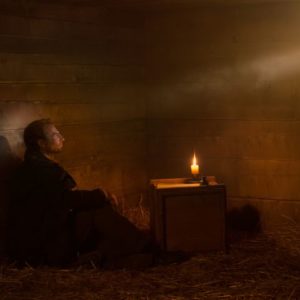By Cassandra Hedelius

It was the first time in my life I felt real terror.
On a lovely spring day in 1999, I was a high school sophomore eating lunch. My school was about twenty miles from Columbine. I vaguely overheard some snippets of conversation about something frightening. We finished lunch and went to class, and the vague murmurs coalesced into rumors–murder. Shooting. We were locked down in our classrooms. The teacher told us there was an attack at another school and a possible threat at ours. Finally they said to go straight outside, do not stop at your locker, get on your bus and go home. I watched the news, horrified, all evening. I didn’t sleep well, and imagined armed killers in the hallway.
The next morning in Seminary, it was my turn to choose a scripture for the devotional. I hadn’t prepared ahead of time, and I was still upset and afraid. I aimlessly opened the Doctrine and Covenants and read:
Fear not what man can do, for God shall be with you forever and ever.
It was the perfect comfort at the time, and since then has always reminded me that the scriptures are powerful and timely. It was years longer before I realized the depth of what it taught.
It’s comforting to know that God is with us in our trials. But the world argues back: “God is all-powerful! Why wouldn’t He just save you from the difficulty?” They despise “thoughts and prayers” and say the only way to love is to prevent and fix life’s tragedies. They’re right that we should try, but wrong to say we shouldn’t teach the comfort of an eternal perspective for those things that we can’t fix.
But it can be hard: “God will be with you in your distress.” Why not, “God will protect you and fix what’s wrong”? Why allow Joseph to be cast into the deep and threatened by the very jaws of hell? Why not deliver him from evil and opposition?
Because all these things shall give thee experience, and shall be for thy good.
In some cases, God comforts us by telling us to take a very long view. You will be inclined to fear what man can do–you have to be commanded not to fear it, against your inclination–because what he can do might be evil almost beyond comprehension. The children slaughtered at Far West, Ammonihah, Auschwitz, Cambodia, Ukraine, Rwanda, Oklahoma City, and Columbine are all known, all loved, all received in Heaven with joy. Their fear and pain are borne by the Savior of the World in His infinite power of understanding and compassion.
God commands: don’t fear what man can do, because your faith looks forward to eternity and even the most unbearable agony will be but a small moment when past. Don’t fear it, because whatever you suffer will enlarge your soul and make you like God. Don’t fear it, because God’s ways are not our ways, and God may call us to walk a path of fear and sorrow because His purposes require it. Don’t fear it, because the Lord gives and takes away, and blessed be the name of the Lord.
These are hard sayings. Only God, who has descended below all things, can say them. Only God, who weeps to see His children’s suffering, can command our loyalty and obedience even when our hearts are broken. Only God, who defeated death and sin, can give us hope instead of fear, beauty for ashes.
The Son of Man hath descended below them all.
Most of the saints who saw family members murdered at Far West and Haun’s Mill didn’t become embittered and leave the church. They blamed evil for their misfortune, instead of blaming God for failing to deliver them. That solid faith reminds me of C.S. Lewis’ description from the devil Screwtape’s point of view: “[The devil’s] cause is never more in jeopardy than when a human, no longer desiring but still intending to do [God’s] will, looks round upon a universe in which every trace of Him seems to have vanished, and asks why he has been forsaken, and still obeys.”
Many voices are arguing, falsely, that because God loves us (very true), God would never ask us to suffer for righteousness (very false). God asked Joseph to persevere in building Zion despite murderous enemies. God asked the saints to gather again and again despite the risk it would stir up anger against them (as it always did). Today, God asks us to remain celibate if we desire a homosexual relationship. God asks us to get vaccinated even if we fear the side effects. God asks us to follow His prophets and His law against our inclinations.
I hope to have the same faith as the early saints, to obey and follow even when it costs me dearly. Christ can ask all of me because He has done all for me. I try to value, above everything else, the promise that comforted me as a scared teenager: God shall be with me forever and ever.
More Come, Follow Me resources here.
 Cassandra Hedelius studied Political Science in Oklahoma and Law in Colorado. She currently lives in Aurora, Colorado and cares full time for her three young children and cat.
Cassandra Hedelius studied Political Science in Oklahoma and Law in Colorado. She currently lives in Aurora, Colorado and cares full time for her three young children and cat.
The post Come, Follow Me Week 43 – Doctrine and Covenants 121-123 appeared first on FAIR.
Continue reading at the original source →



